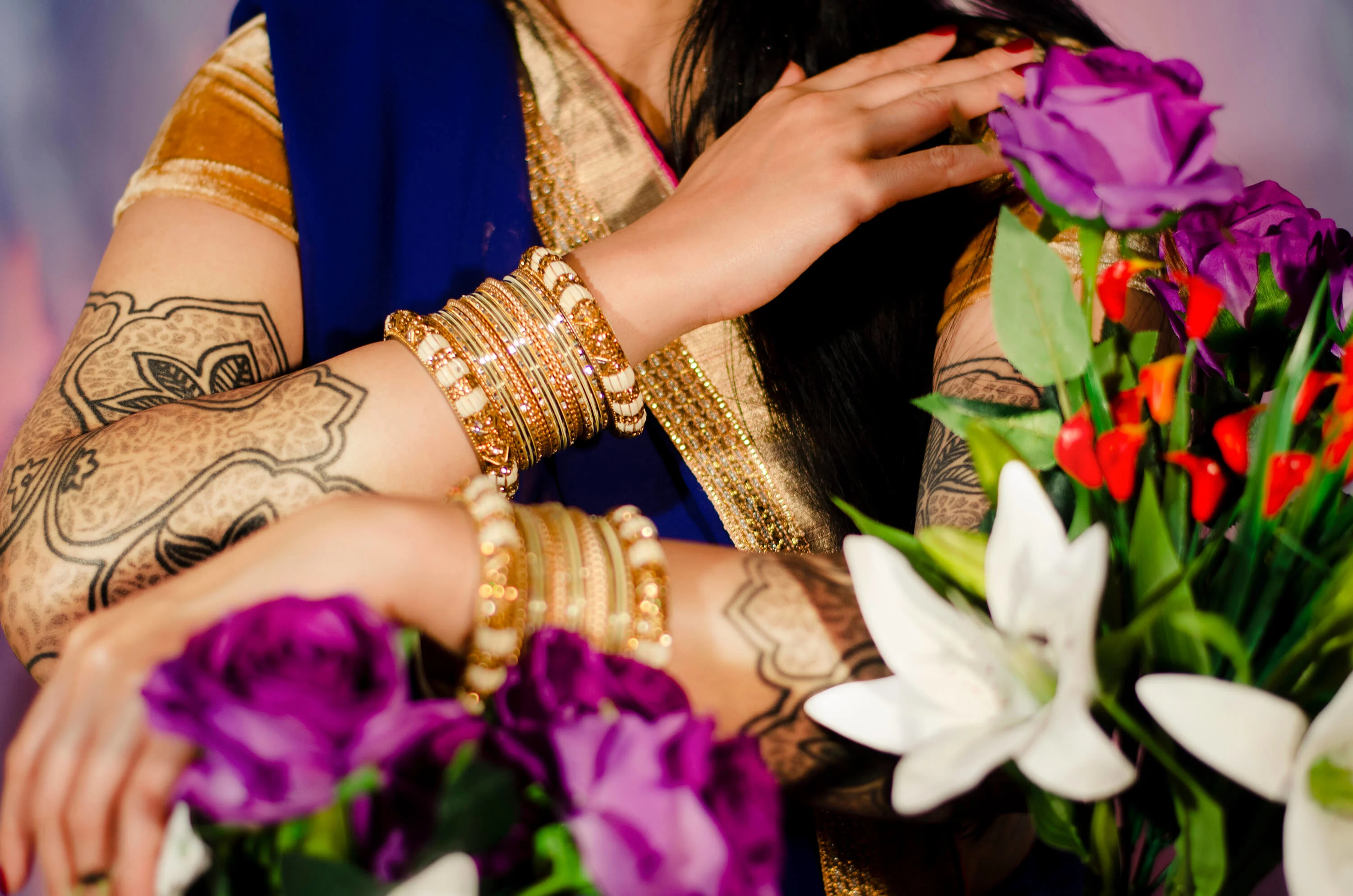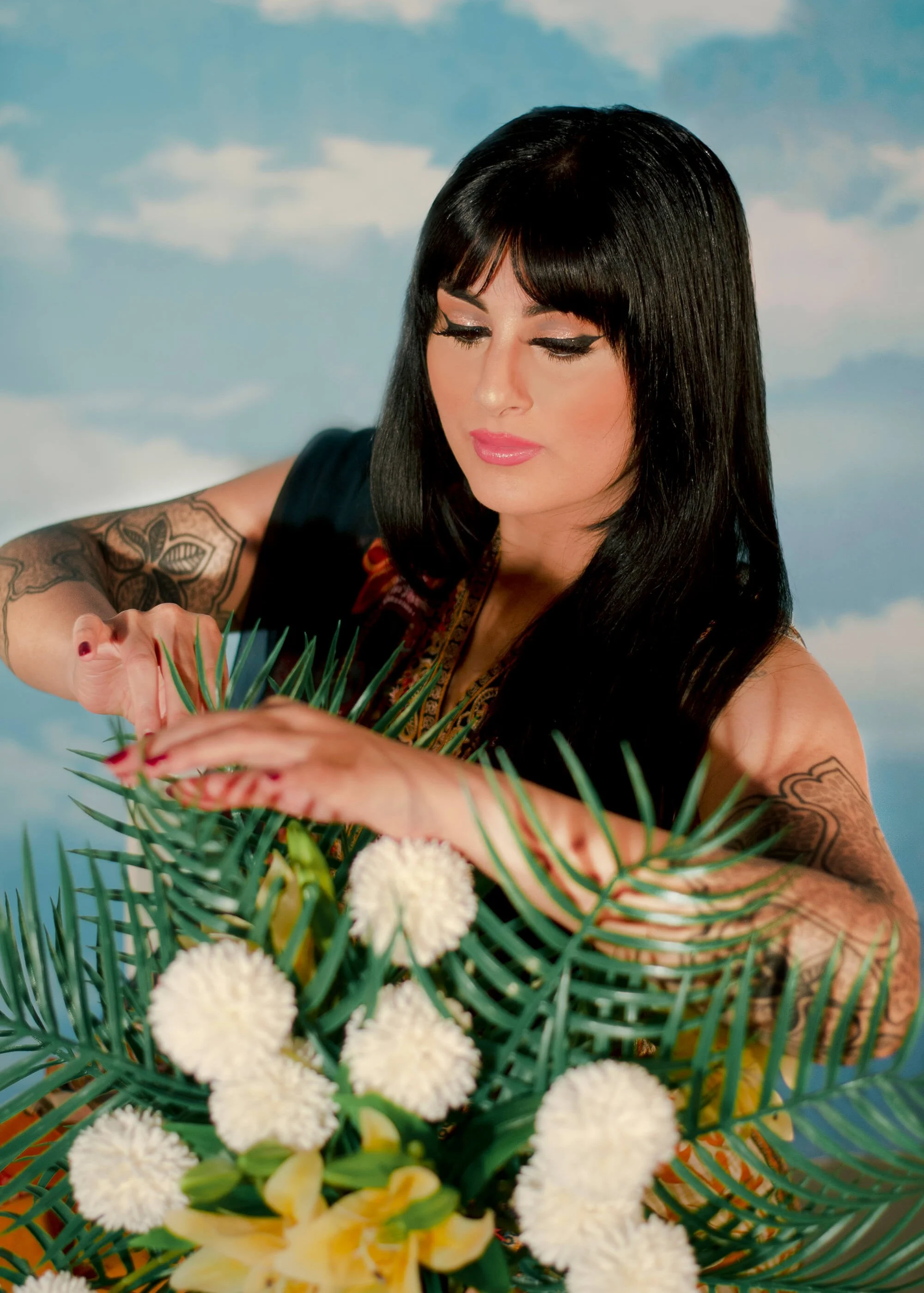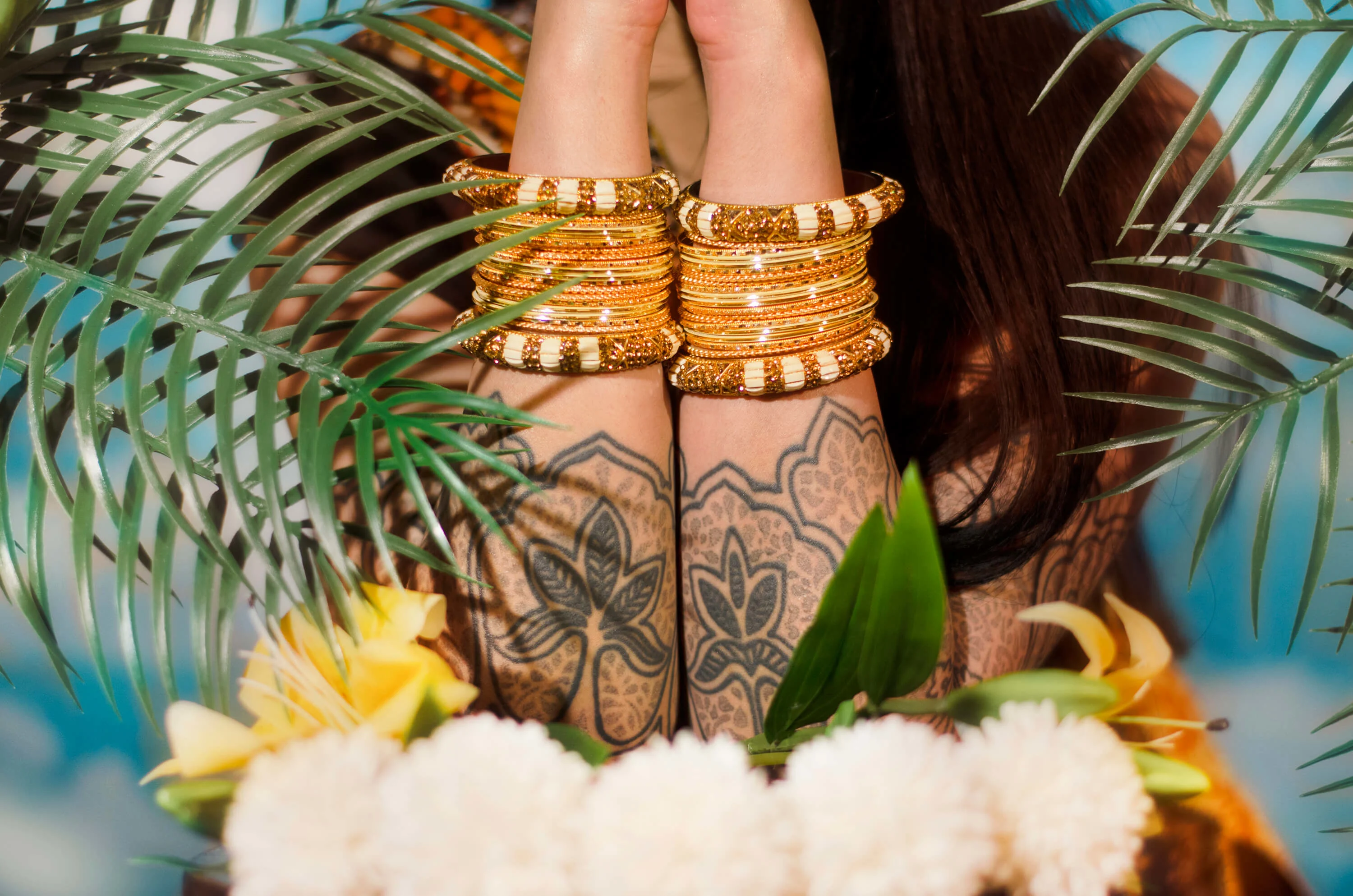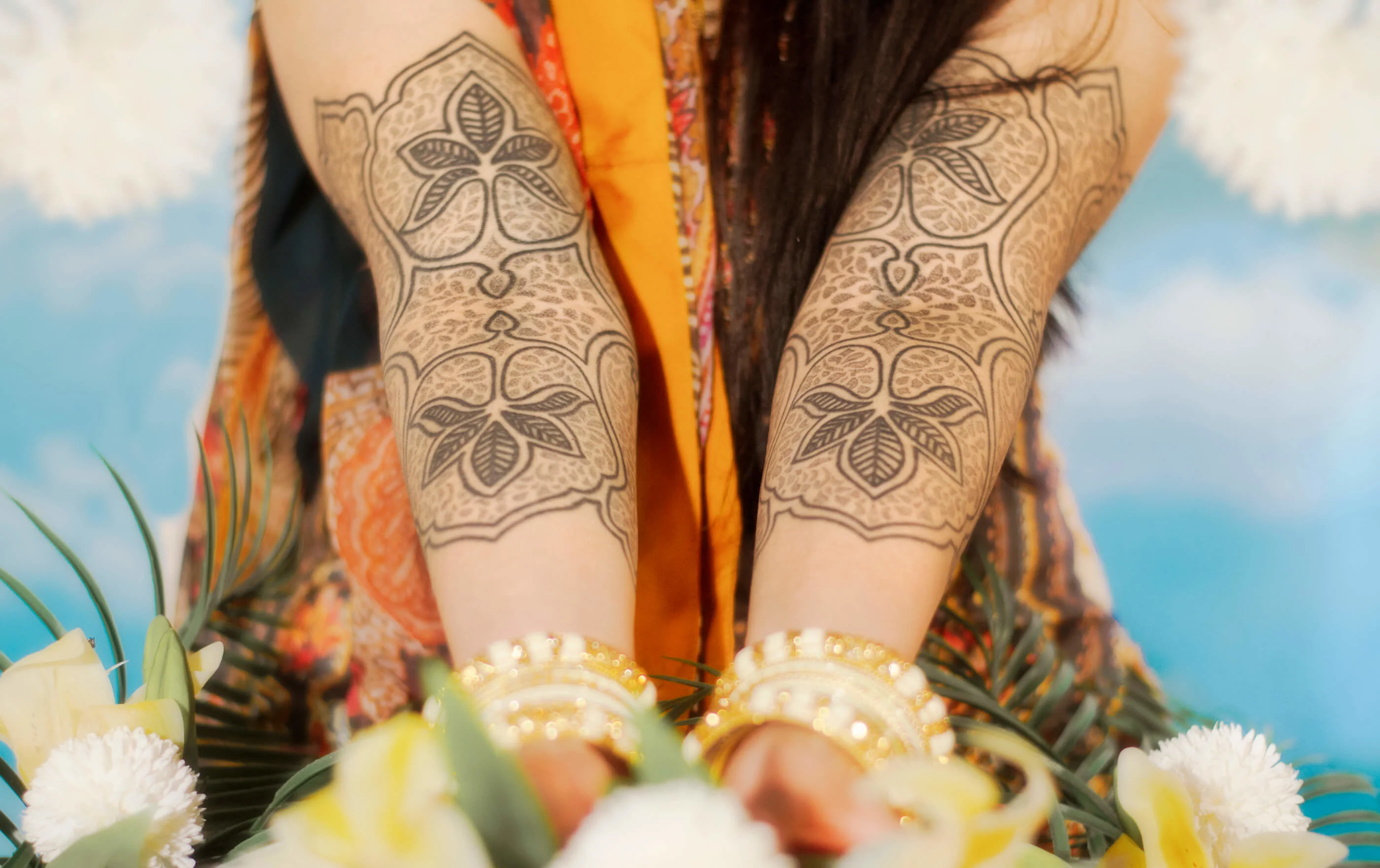
Axa Shareen is a female Muslim tattoo artist who lives and works in London. Wana Udobang profiles her unique creative mind, how her heritage informs her art and the many missions she takes on.
Photos by Nwaka Okparaeke.
There is scuffling in the background as Axa Shareen and I talk on the phone. “I had to say to my mum that this is an important phone call, or else you would have her screaming at me in the background. I am 38 years old and it never stops. I have just learned this,” she giggles.
Axa is at her parents’ home in Manchester to mark the beginning of Ramadan – the holy month of fasting, prayer and reflection for Muslims – with her family. Faith and family are two things Axa takes very seriously, even though the tattoos that snake around her body can give off a very different impression of her. “It confuses the hell out of people,” she says, and you sense she enjoys the shock a little.
She pauses. “I am a bit wild and I’m a Pisces as well, so I’m a little fluid and hard to pin down.” That fluidity results in a creative practice that moves between tattooing, painting and design.

For a British-Pakistani Muslim woman, becoming a tattoo artist wasn’t exactly the dream her parents had for her. Though they have become very supportive of her professional life, there was a time when there was a lot of resistance.
“I am very close to my parents now, but it’s 20 years into my journey,” Axa says. “At the beginning, there was so much confusion and misunderstanding. My dad would say, ‘Why don’t you consider being a teacher’?”
Axa’s parents migrated from Pakistan to Bradford in the north of England in the late 1970s. Axa, or Aqsah as she was named, was born in 1981 in Stockport, just outside of Manchester.
At school she excelled in art, so much so that one teacher insisted on a personal meeting with her parents to convince them to allow her to study it at A level. “Mr Johnson is just a wonderful soul,” Axa says. “My parents have always encouraged my art, but when it came to a professional life and earning money, it was like oh, is this a credible path to go down?”


Mr Johnson got his way and Axa went on to study interactive arts at Manchester Metropolitan University. After graduating, in search of a job to support her creative passions, she found herself as a receptionist at a high-end tattoo studio.
“I thought I would do a few hours to support my painting and I ended up taking over the whole place because I work with so much passion and drive,” she says. She found clients who trusted her despite her limited experience: she still tattoos many of them for free to thank them for their early faith in her.
These days, her work is known for its ornate detail, delicate shading, geometric and henna designs which she credits to her background. When she was young, the family visited Pakistan often and these trips began to subconsciously inform her visual aesthetic.
“Pakistan is engrained with Islamic geometry, Mehndi and henna designs,” Axa explains. “It’s everywhere – the plates, the teacups, the rugs, the architecture. They have very beautiful ancient temples and every millimetre of these places is covered in gorgeous decorative designs. When you are a kid, and a visual person, it changes you and it shapes you.”

But 20 years ago when Axa started tattooing, it was often difficult to express her own design aesthetic in an industry that was very male and very western. “They used to tell me it was impossible to use my style. It’s too fine. It’s too delicate. It won’t last. I was always told why it wouldn’t work.”
It wasn’t just that tattoo artists couldn’t create these elaborate, geometric, south Asian inspired designs, it was also that customers didn’t want them. “Back then you just picked something off the wall and got it done,” Axa says.
But a lot has changed in the last two decades, and what Axa was often told was impossible has now become the rave. But that has drawbacks too – the exoticization and commercialization of cultural aesthetics mean the history of these artistic styles get forgotten or ignored.
“These styles are ingrained in our belief systems, our values and our morals. That does matter to me.” She continues, “The way it is at the moment, it’s just fashion to most people. They have no idea of its significance, of what it means. This is our history. I don’t mean to sound negative but what do you do about that?”


Another mantle she has taken on is the issue of tattooing people of color. She didn’t know any black or brown tattoo artists when she was coming up and white tattoo artists seemed to panic when non-white clients came in. “They were not familiar with non-white skin so they got nervous,” she says. “The darker the skin, the more nervous they were.”
It frustrates her that although tattooing comes from non-European cultures, people of color sometimes struggle in the west to get the right service.
“Yes, darker skin can be more susceptible to keloids but you just have to be skilled enough to perform it,” Axa says. “I used to have so many people of color coming to me saying they were always told they couldn’t get tattoos, but you can. You absolutely can.”

She is fired up by taking on injustice, and heaves a huge sigh when asked about her experiences as a woman in the tattoo industry.
“You couldn’t make it up. I wouldn’t even call it sexism; I would call it harassment. I think if it was any other workplace, there would have been court cases.”
Her way of dealing with it was to retreat from a lot of social activity around the tattoo industry, including conventions. “As a woman from an Islamic background, my lifestyle didn’t resonate with all the other tattooers that I knew, and you can use your own imagination on what I am talking about.”

Right now she admits her career is in a contented phase. “I have finally got a balance that I am happy with,” she says, and she isn’t taking on new clients at all at the moment.
“I have got design work for clients in India. I am doing some portrait work for clients in Pakistan, and I will be traveling back to complete the painting. I’m doing gorgeous tattoos for wonderful people in England. For me, this is perfection.”